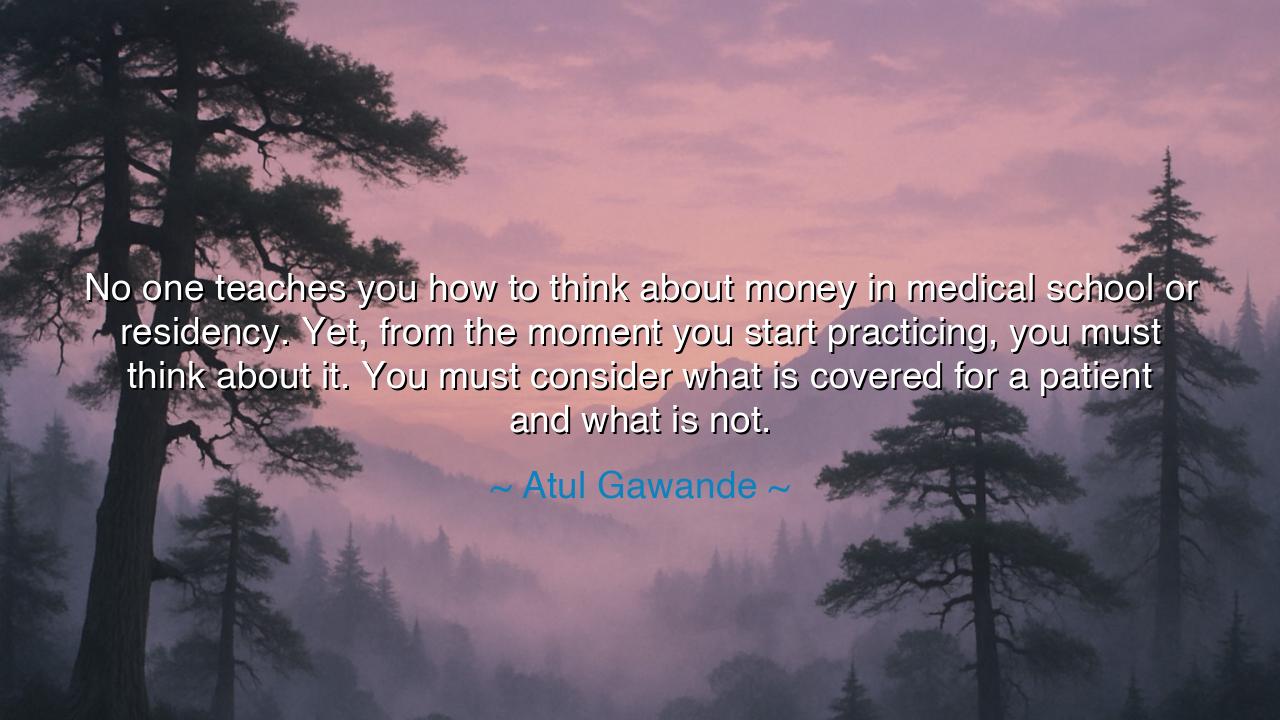
No one teaches you how to think about money in medical school or
No one teaches you how to think about money in medical school or residency. Yet, from the moment you start practicing, you must think about it. You must consider what is covered for a patient and what is not.






"No one teaches you how to think about money in medical school or residency. Yet, from the moment you start practicing, you must think about it. You must consider what is covered for a patient and what is not." — Atul Gawande
Hear now the sober wisdom of Atul Gawande, the healer and philosopher of our age, who speaks not only of medicine, but of morality in a world of means. His words pierce the veil of illusion that surrounds the sacred art of healing, revealing the conflict that every physician must one day face — the tension between compassion and cost, between the calling to heal and the realities of a system bound by gold. When he says, “No one teaches you how to think about money in medical school or residency,” he laments the innocence — or perhaps the blindness — of a profession that trains the mind to save lives, but not to navigate the worldly structures that determine how those lives are cared for.
For in ancient times, the physician’s duty was pure and singular — to heal, regardless of cost or class. In the temples of Asclepius, the sick came with faith, and the healer offered skill as a sacred trust. But in the modern world, the healer stands within a web of commerce and policy, where every act of mercy must pass through the gate of economics. Gawande’s words remind us that knowledge of the body is not enough — that the physician must also learn the language of systems, of coverage, of what is “allowed.” For medicine has become not only the art of healing flesh, but the struggle to preserve dignity within a machinery that counts lives in numbers.
He speaks from the soil of his own experience — for Atul Gawande, both surgeon and writer, has long stood at the crossroads of ethics and practice. He has seen patients not fail because of illness, but because of affordability, seen choices dictated not by science, but by policy. When he says, “You must consider what is covered for a patient and what is not,” he mourns the fact that modern medicine forces healers to become arbiters of access — to decide, consciously or not, who receives care and who is left to suffer. It is a burden that weighs not only upon the doctor’s mind, but upon his soul.
Consider the story of a young surgeon in a crowded emergency ward. A mother arrives with her child — feverish, weak, frightened. The cure is known, the treatment within reach. Yet the medicine is not covered by her plan, and the hospital cannot supply it freely. The surgeon faces a choice: to break policy and risk penalty, or to uphold the system and let the child wait. This moment — not taught in medical school — is the crucible Gawande describes. For here, medicine is no longer only about anatomy, but about justice; no longer about skill, but about conscience. Such choices carve deep lines into the hearts of those who swore an oath to heal all.
The ancients, too, wrestled with this conflict. The Hippocratic Oath commands the healer to do no harm — yet what of the harm done by inaction, by a system that withholds care for lack of coin? In every age, healers have walked the border between ideal and reality, but never has the divide been so wide. Gawande’s words are not condemnation, but awakening. He calls upon both the physician and the society to see that medicine cannot flourish in ignorance of economics. To heal the sick, one must also understand the diseases of the system — the inequities, the inefficiencies, the cold arithmetic that too often dictates mercy.
Thus, the teaching is twofold. To the healer, it says: do not shrink from understanding the cost of care, for knowledge of money is knowledge of access, and ignorance serves no one. To the citizen, it says: do not demand from your physicians the impossible purity of saints while denying them the power to reform the structure they serve. Medicine must be both science and stewardship, both compassion and clarity. True healing begins not only at the bedside, but also in the halls where policy is made, where those with wisdom must speak for those without voice.
So, O seekers of virtue, take this lesson from Atul Gawande: in every noble pursuit, whether healing, teaching, or governing, one must learn to navigate the balance between ideal and reality. Purity of heart must walk hand in hand with practical understanding. If you would build a better world, you must not only dream of goodness, but also learn the mechanics of how goodness is delivered. For compassion without structure is fragile, and systems without compassion are cruel. Therefore, let wisdom guide your hands and justice guide your mind — that you may heal not only bodies, but the world itself.
Thus spoke Gawande, reminding us that medicine — and indeed all human endeavor — is both art and architecture. And if the architecture is flawed, then even the noblest art cannot endure. To think about money is not to betray compassion; it is to strengthen it — to ensure that no one is left behind because of what they cannot afford. For the true physician heals not only the patient before him, but the society that shapes the patient’s fate.






AAdministratorAdministrator
Welcome, honored guests. Please leave a comment, we will respond soon